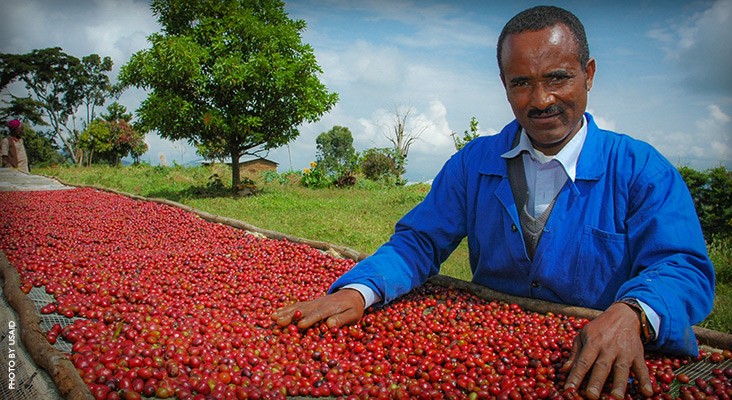Speeches Shim

The Ethiopian Government has developed comprehensive agricultural and economic development plans that have contributed to the country’s substantial growth in agriculture, industry and services sectors. These efforts have been accelerated over the past couple of years through an unprecedented economic reforms process that seeks to build on the country’s tremendous growth in the number, diversity and market share of private businesses in the Ethiopian economy. However, continuing challenges such as unskilled labor, high transport costs, limited financial and telecommunications services, and land tenure insecurity remain. Further, investments by the private sector lag behind those of government and the country continues to rank low in the World Bank’s Ease of Doing Business Index.
USAID is committed to making investments in Ethiopia that enhance the competitiveness of its economy and create more jobs to ensure that all Ethiopians are more resilient and can provide their families a better standard of living. In order to accomplish this, our mission is to advance an environment that supports increased private sector investment and growth. We endorse private sector development within our core Feed the Future activities alongside an array of standalone activities aimed at enhancing policies, expanding access to finance, and creating the necessary environment for private sector growth.
We work closely with the Government of Ethiopia to advance a business-friendly and enabling policy environment in order to promote increased private sector investment and growth, and expand trade opportunities. We work with producers, processors and suppliers to build private sector capacity and competitiveness. We also foster private sector development by enabling a more stable and inclusive financial system. This is achieved by promoting discussion between private and public institutions and improving business development services for small and medium enterprises.
USAID also encourages growth of the private sector and microenterprises in Ethiopia by improving access to finance and credit for underserved populations. Our development credit portfolio focuses on women and local entrepreneurs engaged in small- and medium-sized business activities in agriculture and health. Ethiopia’s farmers lack access to finance, which they need to modernize their practices and purchase or lease machinery. Ethiopian banks generally require collateral valued at a minimum of 100 percent of the value of the loan, plus interest, which is unattainable for most farmers. Since all Ethiopian land belongs to the government, farmers cannot use the land they lease as collateral and banks do not accept crops or other farm stock as collateral.
To expand access to credit in the agricultural and health sectors in Ethiopia, we established a loan portfolio facility shared by eight private commercial banks. For agriculture, the program supports the banks in extending credit to agricultural cooperatives, livestock marketing groups, private sector agro-processors, and private sector commercial horticulture producers. We have a dedicated loan guarantee focused on the expansion of women-owned businesses. In health, we have expanded lending to private health sector enterprises, particularly those providing HIV/AIDS and TB services, which have enabled private clinics, pharmacies and hospitals to make quality improvements and expand services to more people across the country.
KEY ACTIVITIES
- The Feed the Future Ethiopia Value Chain Activity contributes to the Government of Ethiopia’s objective to improve agricultural productivity and commercialization of smallholder farmers. It emphasizes increasing nutrition-sensitive productivity of targeted value chains with a focus on inclusion of women and youth, and helps link smallholder farmers and agribusinesses to buyers and opportunities for greater income generation and trade potential, while also expanding access to credit, technology, information, training, and leadership opportunities.
- Our Feed the Future Ethiopia Land Governance Activity works with the Government of Ethiopia to improve governance and policy to enhance land tenure rights for farmers and pastoralists, empowering them to contribute more fully to their families’ and their communities’ economic growth prospects.
- USAID’s Workers Wellness Alliance works with companies and workers at Hawassa Industrial Park to enhance the workplace environment and overall quality of life for employees, and contribute to workforce retention and productivity for businesses to increase their competitiveness in the exports.
- The USAID Market Systems for Growth activity fosters enterprise-driven growth, especially among Ethiopian private businesses that have high-growth potential. The project works with government and private sector stakeholders, including the Ministry of Finance, Ethiopian Investment Commission, Jobs Creation Commission, and others to build a stronger private sector in order to reduce the country’s dependence on donor assistance and foreign debt financing.
- In partnership with Harvard University’s prestigious Kennedy School of Business, our Advancing Economic Growth Diversification project engages the Ethiopian government and the private sector to advance research and knowledge-sharing to develop a more effective policy framework and business-friendly environment to accelerate economic transformation.
KEY RESOURCES
News
RELATED PHOTO GALLERIES


Comment
Make a general inquiry or suggest an improvement.